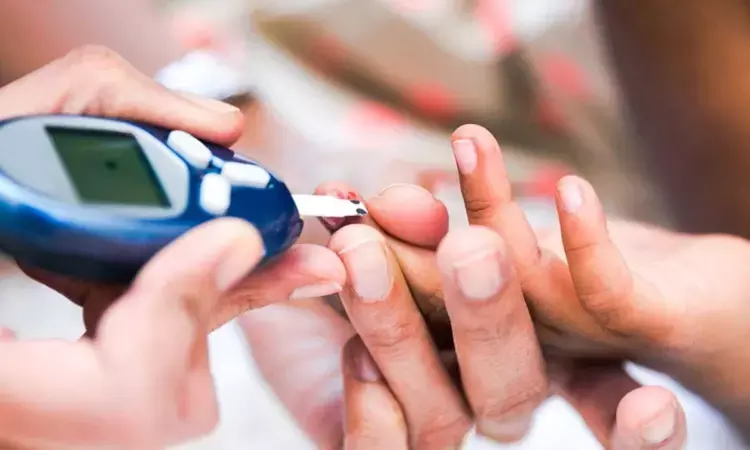- Home
- Medical news & Guidelines
- Anesthesiology
- Cardiology and CTVS
- Critical Care
- Dentistry
- Dermatology
- Diabetes and Endocrinology
- ENT
- Gastroenterology
- Medicine
- Nephrology
- Neurology
- Obstretics-Gynaecology
- Oncology
- Ophthalmology
- Orthopaedics
- Pediatrics-Neonatology
- Psychiatry
- Pulmonology
- Radiology
- Surgery
- Urology
- Laboratory Medicine
- Diet
- Nursing
- Paramedical
- Physiotherapy
- Health news
- Fact Check
- Bone Health Fact Check
- Brain Health Fact Check
- Cancer Related Fact Check
- Child Care Fact Check
- Dental and oral health fact check
- Diabetes and metabolic health fact check
- Diet and Nutrition Fact Check
- Eye and ENT Care Fact Check
- Fitness fact check
- Gut health fact check
- Heart health fact check
- Kidney health fact check
- Medical education fact check
- Men's health fact check
- Respiratory fact check
- Skin and hair care fact check
- Vaccine and Immunization fact check
- Women's health fact check
- AYUSH
- State News
- Andaman and Nicobar Islands
- Andhra Pradesh
- Arunachal Pradesh
- Assam
- Bihar
- Chandigarh
- Chattisgarh
- Dadra and Nagar Haveli
- Daman and Diu
- Delhi
- Goa
- Gujarat
- Haryana
- Himachal Pradesh
- Jammu & Kashmir
- Jharkhand
- Karnataka
- Kerala
- Ladakh
- Lakshadweep
- Madhya Pradesh
- Maharashtra
- Manipur
- Meghalaya
- Mizoram
- Nagaland
- Odisha
- Puducherry
- Punjab
- Rajasthan
- Sikkim
- Tamil Nadu
- Telangana
- Tripura
- Uttar Pradesh
- Uttrakhand
- West Bengal
- Medical Education
- Industry
Children with prediabetes and obesity more likely to progress to diabetes

A new Journal of the Endocrine Society study highlights how to identify children at high risk of developing type 2 diabetes and strategies for prevention, such as anti-obesity or anti-diabetes medication and lifestyle changes.
Prediabetes is a health condition in which blood sugar levels are higher than normal, but not yet high enough to be diagnosed as type 2 diabetes. Prediabetes increases the risk of developing chronic kidney disease, heart disease and stroke. Around 5%-10% of adults with prediabetes develop diabetes each year.
Over the past three decades, there has been a sharp increase in the incidence and prevalence of childhood obesity, prediabetes and type 2 diabetes. At least 1 in 5 adolescents are estimated to have prediabetes. It is not clear whether the adult definition of prediabetes is appropriate for children as fewer progress to diabetes during childhood.
“We found that higher levels on certain diabetes screening tests (non-fasting glucose and hemoglobin A1c) and worsening obesity may better predict diabetes risk in children,” said study author Ashley H. Shoemaker, M.D., M.S.C.I., of Vanderbilt University Medical Center in Nashville, Tenn. “This is a real-world study that highlights ways to identify the children at highest risk for diabetes and possible strategies for diabetes prevention in children such as treatment with anti-diabetes or anti-obesity medications. Our study found patients who were on metformin had lower blood sugar levels and were slower to progress to diabetes.”
The researchers found 6.5% of 552 pediatric patients with prediabetes developed type 2 diabetes over the 7-year period of their study. They identified a few risk factors, including higher HbA1C and non-fasting glucose levels, and worsening obesity. The study found boys progressed more commonly and more quickly to type 2 diabetes than girls.
“Weight stabilization and metformin therapy could be important interventions for diabetes prevention in children,” Shoemaker said.
Reference:
Natasha Belsky, Jaclyn Tamaroff, Ashley H Shoemaker, Risk Factors for Progression to Type 2 Diabetes in a Pediatric Prediabetes Clinic Population, Journal of the Endocrine Society, Volume 7, Issue 11, November 2023, bvad118, https://doi.org/10.1210/jendso/bvad118.
Dr Kamal Kant Kohli-MBBS, DTCD- a chest specialist with more than 30 years of practice and a flair for writing clinical articles, Dr Kamal Kant Kohli joined Medical Dialogues as a Chief Editor of Medical News. Besides writing articles, as an editor, he proofreads and verifies all the medical content published on Medical Dialogues including those coming from journals, studies,medical conferences,guidelines etc. Email: drkohli@medicaldialogues.in. Contact no. 011-43720751


